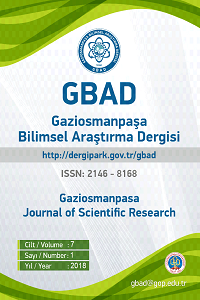Kırsal Alanda Annelerin Okul Öncesi Dönemdeki Çocuklara Karşı Tutum ve Davranışlarının Karşılaştırmalı Değerlendirilmesi
Kırsal alan, kırsal toplum, okul öncesi dönem, anne-çocuk iletişim
Comparative Evaluation of Mother Attitudes and Behaviors Toward Preschool-Aged Children in Rural Areas
rural areas, rural society, preschool period, mother–child communication,
___
- Akbaş, B. and Temiz, G. 2015. An Investigation of the Empathy Skills Levels of Children of Ages between 60- 66 Months With Respect to Their Mothers Empathy Skills Levels. Trakya University Journal of Education Faculty 2015, Vol 5, No 2, 106-112.
- Akıllıoğlu, K., Karadepe, M. and Binokay, U.S. 2014. Effect of Maternal Deprivation on Brain and Behaviors in Experimental Models. Archives Medical Review Journal, 2014; 23(2):257-271.
- Argon, T. and Kıyıcı, C. 2012. Teacher Views in Primary Schools about Parental Participation in Education. Dicle University Journal Ziya Gökalp Faculty of Education, 19 (2012) 80-95.
- Bowly, J. 1982. Attachment and Loss. Volume I, Second Edition. Library of Congress Catalog Number: 83-71445, ISBN 0-465-00543-8 (paper)
- Buyruk Genç, A. 2008. Prediction of Shyness by Cognitive Distortions, Parent-Adolescent Relationships, and Other Individual Variables in Adolescence. Ankara University, Graduate School Educational Sciences, Guidance and Psychological Counselling Department, Unpublished Master Thesis, Ankara.
- Büyükbay, E. and Gözener, B. 2011. The Role of Women in Education of Her Child and The Relationship Between Education Level of a Mother and Her Child in Rural Areas: Case of Tokat Province. Women’s Education in Turkey and Japan for Social Development. Çanakkale. Printing House: Pozitif Publication. Ankara. pg. 361-375. ISBN: 978-605-4222-16-2.
- Çağdaş, A. and Seçer, Z. 2004. “Anne Baba Eğitimi”. Konya: Eğitim Kitabevi
- Çalışır, H., Özvurmaz, S., Tuğrul, E. and Şahbaz, M. 2011. The Relationship Between Toilet Training Methods Used by Mothers and Bedwetting in Children the Age of 1-4 Years. Journal of Anatolia Nursing and Health Sciences, 2011; 14: 17-24.
- Çelenk, S. 2003. The Prerequisite for School Success: Home-School Cooperation. İlköğretim Online E-Journal, 2 (2), 2003 sf. 28-34. URL: http://www.ilkogretim-online.org.tr Date of access:16.01.2017.
- Durakoğlu, A. 2011. Characteristics of Early Childhood Period According to Maria Montessori. Dicle University Journal Ziya Gökalp Faculty of Education, 16 (2011) 133-145
- Dursun, Ş. and Dede, Y. 2004. The Factors Affecting Students’ Success in Mathematics: Mathematics Teachers’ Perspectives. Gazi University Journal of Gazi Educational Faculty (GUJGEF), Volume: 24, Number 2 (2004) 217-230.
- Grace, C., Zaslow, M., Brown, B., Aufseeser, D. and Bel, L. 2011. Rural Disparities in Baseline Data of the Early Childhood Longitudinal Study.- In Early Childhood Education in Rural Communities: Access and Quality, UNCF/Frederick D. Patterson Research Institute.
- Hassoy, P. and Çakıcı, M. 2012. The Information Level and Attitudes of Families About Children Behavioral Disorders. H.U. Journal of Aducation. Spacial Issue: 2 (2012), 1-14.
- Koçak, N.N. 2012. A Study on The Social Skills of Rural and Urban Primary School Children. Ankara University Graduate School of Naturel and Applied Sciences Department of Home Economıcs (Child Development and Education), Unpublished Master Thesis, Ankara.
- Kuzgun, Y. 1972. Kendini Gerçekleştirme. Ankara University Journal of The Faculty of Languages and History-Geography, 10(1) pg:162-178.
- Kuzgun, Y. 1973. Ana-Baba Tutumlarının Bireyin Kendini Gerçekleştirme Düzeyine Etkisi. Hacettepe University Journal of Social Sciences, 5(1), pg: 57-70.
- Önen, S., Aksoy, İ., Taşar, A.M., and Dallar Bilge, Y. 2012. Factors that affect toilet training in children. Medical Journal of Bakırköy, Volume 8, Number 3.
- Öngider, N. 2013. Relationship Between Parents and Preschool Children. Current Approaches in Psychiatry 2013;5(4):420-440
- Özçetin, M., Uluocak, N., Yılmaz, R., Atılgan, D., Erdemir, F and Karaarslan, E. 2010): The Evaluation of Urinary Incontinence in Preschool Age Children. J Child 2010; 9(2):75-81, doi:10.5222/j.child.2010.075.
- Özkafacı, A.A. 2012. Analyzing the Relationship Between Mother’s Attitude Towards Growing up Children and Social Skill Level of The Children. Unpublished Master Thesis. Istanbul AR-EL University, Instute of Social Sciences.
- Özyürek, A., Bedge, Z. and Özkan, İ. 2013. Determining the Views of Parents on Nutrition At Preschoolers. International Refereed Academic Social Sciences Journal (UHBAB), 2013; 2 (4) Jel Code: I ID:54 K:86. www.uhbabdergisi.com
- Sak, R, Şahin Sak, İ.T., Atlı, S. and Şahin, B.K. 2015. Preschool Period: Parenting Attitudes. Mersin University Journal of the Faculty of Education, 2015; 11(3): 972-991, DOI: 10.17860/efd.33313
- Salı, G. 2012. The Development of Empathy in Early Childhood Period and The Role of The Family. International Journal of Early Childhood Education Research, Vol. 1, No. 1, pg. 63-92.
- San Bayhan, P. ve Artan, İ. 2011. Çocuk gelişimi ve eğitimi. İstanbul: Morpa Kültür Publication.
- Şirin, F.S. 2013. The Power and Child. Turkish Studies - International Periodical For The Languages, Literature and History of Turkish or Turkic. Volume 8/8 Summer 2013, p. 1275-1284, Ankara-Turkey.
- Türkoğlu, B., Çeliköz, N. and Uslu, M. 2013. Fathers’ Views about Perceptions of Quality Time With Their Children Between The Ages of 3-6. Journal of Research in Education and Teaching, May 2013. Volume:2, Number:2, Article No:06 ISSN: 2146-9199.
- Winnicot, D.W. 1998. Oyun ve Gerçeklik. Orignal Title: Playing and Reality. (Translation: Tuncay Birkan). Metis Publication, ISBN-13: 978-975-342-180-5, Istanbul.
- Yağan Güder, S. 2019. Rose with Thorns: Phenomenological Study Regarding Being a Preschool Teacher in Rural Areas in Turkey. ENAD Journal of Qualitative Research in Education – JOQRE, 7(3), 921-941. doi: 10.14689/issn.2148-624.1.7c.3s.2m
- ISSN: 2146-8168
- Yayın Aralığı: Yılda 3 Sayı
- Başlangıç: 2012
- Yayıncı: Tokat Gaziosmanpaşa Üniversitesi
Kırsal Alanda Kahvehane Alışkanlığı: Tokat İli Merkez İlçe Örneği
Süt Ürünlerinde Starter Kültür Kullanımı
Kuraklık Stresi Altında İndol Asetik Asitin Şeker Pancarına (Beta vulgaris L.) Etkisi
Kadının Çalışmasına Yönelik Tutum ve Cinsiyet Rolleri (Çorum İli Merkez Köyler Örneği)
Nuray KIZILASLAN, Zehra DEMİGAN
Burhan DURHAN, Emine YALÇIN, Kültigin ÇAVUŞOĞLU, Ali ACAR
Taner TUNÇ, Burak YILMAZ, Samet Hasan ABACI
Osman IŞIK, Resul GERÇEKCİOĞLU
Elmas Takviyeli Kompozit Matkapların Kullanım Ömrüne Matris Alaşımlarının Etkisi
